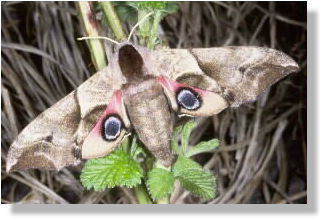 |
Not only caterpillars,
also the grown-up moths know well how to impress their predators.
The Eyed Hawk-moth (Smerinthus ocellata) reveals eye-like spots on its hind-wings, whereas in its resting state the camouflage colors on its fore-wings merge it imperceptibly into the dry undergrowth of the canopy. "An animal that has eyes this big must have a correspondingly big mouth" is what the pattern of the hind-wings suggests to a surprised predator. "What is this big longish thing in the middle - could it be a beak? Is there a bird looking at me?" The bewildered enemy would stop its pursuit and retire to a safe place, the moth having reached its aim. |